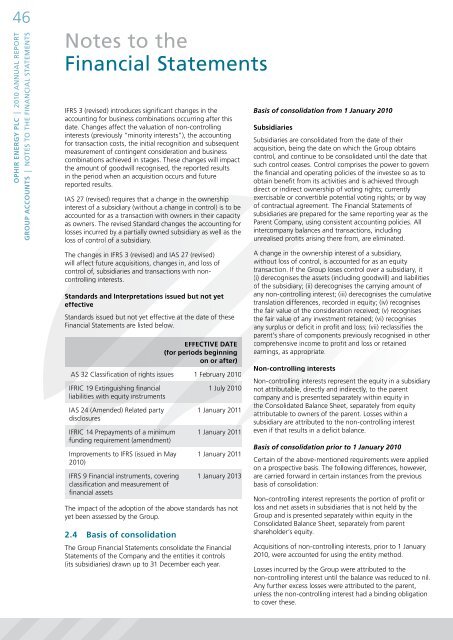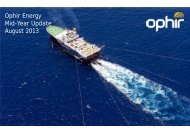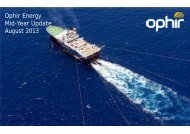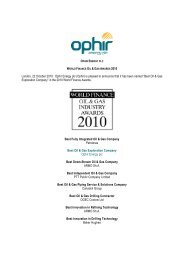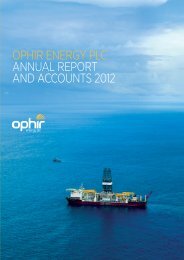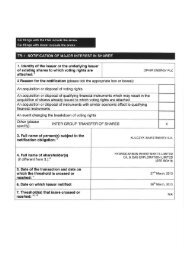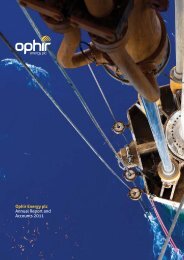Annual Report 2010 - Ophir Energy
Annual Report 2010 - Ophir Energy
Annual Report 2010 - Ophir Energy
You also want an ePaper? Increase the reach of your titles
YUMPU automatically turns print PDFs into web optimized ePapers that Google loves.
46<br />
<strong>Ophir</strong> energy plc | <strong>2010</strong> ANNUAL REPORT<br />
grOUp AccOUnTs | NOTEs TO THE fiNANCiAL sTATEmENTs<br />
Notes to the<br />
financial statements<br />
IFRS 3 (revised) introduces significant changes in the<br />
accounting for business combinations occurring after this<br />
date. Changes affect the valuation of non-controlling<br />
interests (previously “minority interests”), the accounting<br />
for transaction costs, the initial recognition and subsequent<br />
measurement of contingent consideration and business<br />
combinations achieved in stages. These changes will impact<br />
the amount of goodwill recognised, the reported results<br />
in the period when an acquisition occurs and future<br />
reported results.<br />
IAS 27 (revised) requires that a change in the ownership<br />
interest of a subsidiary (without a change in control) is to be<br />
accounted for as a transaction with owners in their capacity<br />
as owners. The revised Standard changes the accounting for<br />
losses incurred by a partially owned subsidiary as well as the<br />
loss of control of a subsidiary.<br />
The changes in IFRS 3 (revised) and IAS 27 (revised)<br />
will affect future acquisitions, changes in, and loss of<br />
control of, subsidiaries and transactions with noncontrolling<br />
interests.<br />
standards and interpretations issued but not yet<br />
effective<br />
Standards issued but not yet effective at the date of these<br />
Financial Statements are listed below.<br />
eFFecTive DATe<br />
(for periods beginning<br />
on or after)<br />
IAS 32 Classification of rights issues<br />
1 February <strong>2010</strong><br />
IFRIC 19 Extinguishing financial<br />
liabilities with equity instruments<br />
IAS 24 (Amended) Related party<br />
disclosures<br />
IFRIC 14 Prepayments of a minimum<br />
funding requirement (amendment)<br />
Improvements to IFRS (issued in May<br />
<strong>2010</strong>)<br />
IFRS 9 Financial instruments, covering<br />
classification and measurement of<br />
financial assets<br />
1 July <strong>2010</strong><br />
1 January 2011<br />
1 January 2011<br />
1 January 2011<br />
1 January 2013<br />
The impact of the adoption of the above standards has not<br />
yet been assessed by the Group.<br />
2.4 Basis of consolidation<br />
The Group Financial Statements consolidate the Financial<br />
Statements of the Company and the entities it controls<br />
(its subsidiaries) drawn up to 31 December each year.<br />
Basis of consolidation from 1 January <strong>2010</strong><br />
subsidiaries<br />
Subsidiaries are consolidated from the date of their<br />
acquisition, being the date on which the Group obtains<br />
control, and continue to be consolidated until the date that<br />
such control ceases. Control comprises the power to govern<br />
the financial and operating policies of the investee so as to<br />
obtain benefit from its activities and is achieved through<br />
direct or indirect ownership of voting rights; currently<br />
exercisable or convertible potential voting rights; or by way<br />
of contractual agreement. The Financial Statements of<br />
subsidiaries are prepared for the same reporting year as the<br />
Parent Company, using consistent accounting policies. All<br />
intercompany balances and transactions, including<br />
unrealised profits arising there from, are eliminated.<br />
A change in the ownership interest of a subsidiary,<br />
without loss of control, is accounted for as an equity<br />
transaction. If the Group loses control over a subsidiary, it<br />
(i) derecognises the assets (including goodwill) and liabilities<br />
of the subsidiary; (ii) derecognises the carrying amount of<br />
any non-controlling interest; (iii) derecognises the cumulative<br />
translation differences, recorded in equity; (iv) recognises<br />
the fair value of the consideration received; (v) recognises<br />
the fair value of any investment retained; (vi) recognises<br />
any surplus or deficit in profit and loss; (vii) reclassifies the<br />
parent’s share of components previously recognised in other<br />
comprehensive income to profit and loss or retained<br />
earnings, as appropriate.<br />
non-controlling interests<br />
Non-controlling interests represent the equity in a subsidiary<br />
not attributable, directly and indirectly, to the parent<br />
company and is presented separately within equity in<br />
the Consolidated Balance Sheet, separately from equity<br />
attributable to owners of the parent. Losses within a<br />
subsidiary are attributed to the non-controlling interest<br />
even if that results in a deficit balance.<br />
Basis of consolidation prior to 1 January <strong>2010</strong><br />
Certain of the above-mentioned requirements were applied<br />
on a prospective basis. The following differences, however,<br />
are carried forward in certain instances from the previous<br />
basis of consolidation:<br />
Non-controlling interest represents the portion of profit or<br />
loss and net assets in subsidiaries that is not held by the<br />
Group and is presented separately within equity in the<br />
Consolidated Balance Sheet, separately from parent<br />
shareholder’s equity.<br />
Acquisitions of non-controlling interests, prior to 1 January<br />
<strong>2010</strong>, were accounted for using the entity method.<br />
Losses incurred by the Group were attributed to the<br />
non-controlling interest until the balance was reduced to nil.<br />
Any further excess losses were attributed to the parent,<br />
unless the non-controlling interest had a binding obligation<br />
to cover these.


